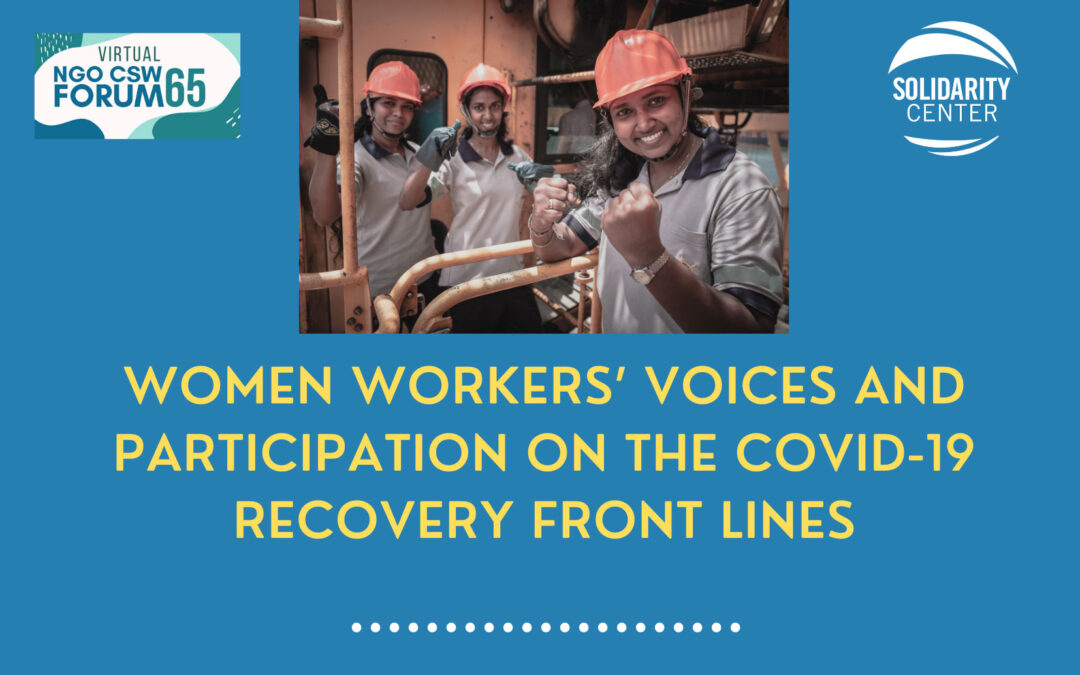
Mar 17, 2021
The COVID-19 pandemic has hit workers hard—but women have especially suffered compared with men, experiencing higher rates of unemployment, discrimination and exposure to the virus, and skyrocketing rates of gender-based violence and harassment (GBVH), speakers said this week at a Solidarity Center panel. Unions are organizing to demand that government responses to the pandemic’s economic and social effects center on the needs and experiences of women workers, ensuring safety and respect for all workers.
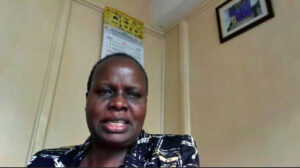
“Women have suffered because most of the work they do is precarious”—Rose Omamo, Kenya
“Women have suffered because most of the work they do is precarious—they are informal workers, frontline workers,” said Rose Omamo, general secretary of the Amalgamated Union of Kenya Metalworkers. Omamo explained how COVID-19 has shown the need to extend social protections like paid sick leave and health care to all workers, and to address issues affecting women in Kenya and worldwide. She shared that rape and sexual assault in the world of work has increased because of economic stress caused by the pandemic, including an increase in domestic violence and increased demands for sexual favors in order to obtain or keep a job. Kenyan unions are organizing to demand that social protections include access to reproductive health services in light of increased sexual violence, and are bargaining with employers to increase protections against GBVH in the workplace.
Omamo was among five women union leaders and Solidarity Center partners who took part in “Women Workers’ Voices and Participation on the COVID-19 Recovery Front Lines,” a virtual parallel event during the United Nations Commission on the Status of Women (CSW) as part of the NGO CSW65 Virtual Forum.
Employers, Government Failing Women Workers in the Pandemic
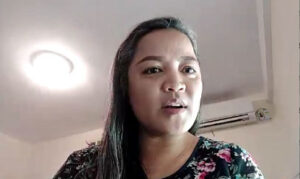
Employers have used COVID-19 as an excuse to violate worker rights, says Cambodian union leader Ou Tepphallin.
Employers have taken advantage of the pandemic to exploit, abuse and lay off workers, panelists said. “Labor rights have been violated during COVID-19 as employers used the opportunity to exploit the system,” said Ou Tepphallin, president of the Cambodian Food and Service Workers Federation.
Retail, hospitality and garment workers in Cambodia, the majority of whom are women, have not been provided adequate personal protective equipment (PPE) or measures to ensure their safety, and unscrupulous employers have taken advantage of the crisis to exploit and abuse workers. For example, workers in the hospitality sector report that entertainment venues have opened illegally during lockdown and forced workers to return to work. Some companies deliberately targeted older or less conventionally attractive workers for layoffs. Unions have been organizing to hold employers to account, negotiating for better protection measures, including protections from GBVH.
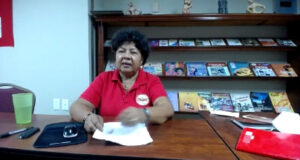
When women are in unions, they can speak out against mistreatment and come together to create solutions, says Honduran union leader Iris Munguia.
In Honduras, the impact of the pandemic collided with ecological and social crises. The devastation caused by two hurricanes in November 2020 left many women homeless and struggling to support their families, said Iris Munguía, women’s coordinator of the Honduran Federation of Agro-industrial Unions (FESTAGRO). In addition, women experience extremely high rates of GBVH, which is treated with impunity in Honduras. More than 30 women have been murdered in 2021, and “there are no investigations of these murders,” Munguia said.
The combined crises have left women workers more vulnerable than ever to exploitation and abuse. The majority of workers laid off during the pandemic were women, and unions have been organizing to ensure women workers are at the bargaining table to win protections from employers, including access to childcare, adequate protective equipment and protections against GBVH at work. Unions in the agricultural sector are demanding that multinational companies do more to ensure greater safety on the job. Munguia discussed the power of union organizing, stressing that women in trade unions had the ability to speak out against mistreatment and come together to create solutions.
In Honduras, Munguía is part of a campaign for C190 ratification, while also training women to be part of negotiations with employers so they can advocate for contract clauses that benefit them, such as childcare and a violence-free workplace.
“We have a great advantage by being unionized,” she said. “Whenever we face discrimination, harassment, we can report it, denounce it, talk about it—and that opportunity is there because we are part of a union.”
‘We Have a Great Advantage: We Are in a Union’
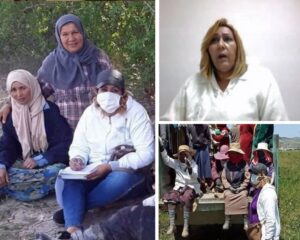
UGTT’s Nadia Bergaoui shared images of women agricultural workers as she discussed the challenges they face at work.
In the face of such challenges, women have stepped up their efforts to achieve justice at the workplace, according to the panelists, including efforts to push their governments to ratify Convention 190. Adopted by the International Labor Organization in 2019, the convention seeks to end violence and harassment in the world of work, including gender-based violence.
Across Tunisia, where 500,000 women work in the informal agricultural sector, the Federation of Agriculture and the Tunisian General Labor Union (UGTT) are working to end gender-based violence through awareness-raising programs that ensure women know their rights on the job and can speak out for safe conditions, especially on the dangerous transport to and from work, said Nadia Bergaoui.
Bergaoui, general secretary, media officer and women’s affairs officer of the Federation of Agriculture, said a union survey in 2020 found that more than half of women said they have faced verbal or physical abuse on the job, and lack access to paid time off, sick leave or health care. The union is organizing workers to demand safe transportation, protections against GBVH, PPE and access to social protections.
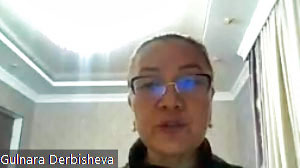
Unions in Kyrgyzstan are advocating for protections for women workers, says Gulnara Derbisheva.
Gulnara Derbisheva, director of Insan Leilek, discussed how unions in Kyrgyzstan are advocating for protections for women workers, including demanding that the government address the increase in GBVH during the pandemic by ratifying Convention 190. Unions, with Solidarity Center support, opened a women migrant worker center in Bishkek, where workers have reported increases in GBVH and other abuse on the job. She shared how she is working with unions to advocate for greater protections for women migrant workers, including ratification of C190.
“Unless we keep advocating, we will be in a standstill,” she said.
Watch a recording of the event, simultaneously translated for Arabic, English, Khmer, Russian and Spanish speakers.
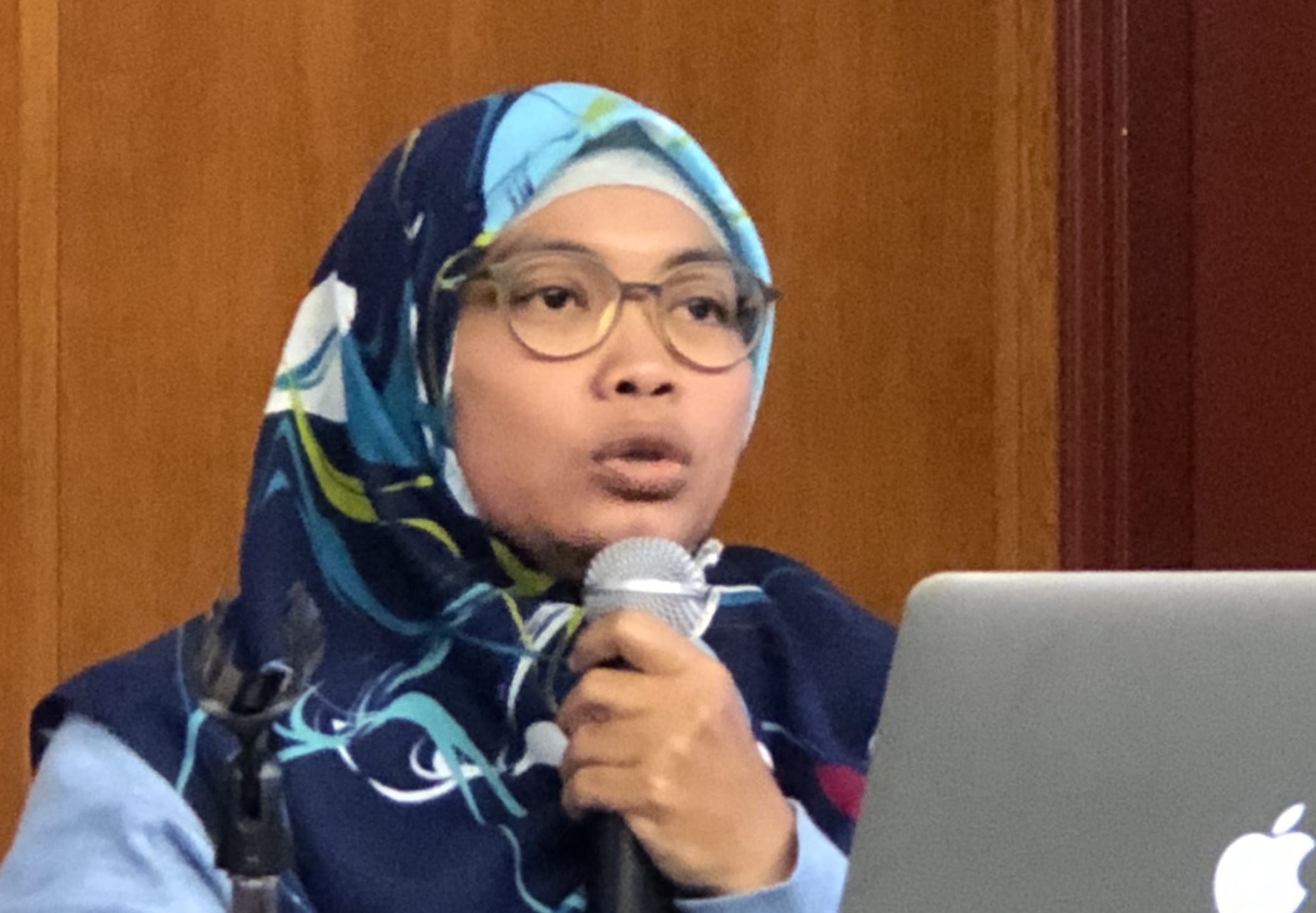
Mar 11, 2019
Women trade unionists in Indonesia and in Honduras and other Central American countries who are tackling gender-based violence at work often start by changing a culture of patriarchy within their own unions, according to speakers at a Solidarity Center-sponsored panel today in New York City.
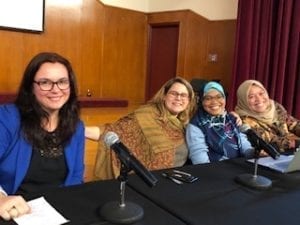
Alexis de Simone, Robin Runge, Nurlatifah and Izzah Inzamliyah discussed strategies for ending gender-based violence at work. Credit: Solidarity Center/Tula Connell
“Unions in the past only focused on economic issues—gender-based violence issues have never been our priority,” says Nurlatifah, board member of the 341,000-member National Industrial Workers Union Federation (SPN–NIWUF) in Indonesia. But after she and other union leaders conducted an in-depth research project among women members that showed 81 percent had experienced gender-based violence, “the union tries to mainstream this issue into every activity the union conducts.”
Nurlatifah spoke on the panel, “Gender-Based Violence at Work and Social Protections,” co-sponsored by the Global Fund for Women, one of dozens of parallel events taking place this week in conjunction with the 63rd session of the United Nations Commission on the Status of Women (CSW) meeting March 11–22. The CSW, a global policy-making body dedicated to promoting gender equality and the empowerment of women, this year is focusing on social protection systems, access to public services and sustainable infrastructure for gender equality and the empowerment of women and girls.
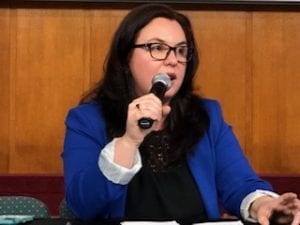
Alexis de Simone highlighted how women in Honduras have addressed gender-based violence in garment factories and farm fields,
In highlighting how workers are organizing and building power to confront gender-based violence in Central America, Alexis de Simone, Solidarity Center senior program officer for the Americas, says years of leadership training among women union members in Honduras’s garment and agriculture sectors has led to more than 80 women becoming union leaders. They now negotiate contracts that address key women’s issues like maternity leave, and in the agriculture sector, have developed a cross-border network that shares contract language that benefits working women.
The Solidarity Center assisted many of those programs in Central America “and now is working with our partners in 17 different countries to support women worker efforts to define gender-based violence at work and to make it a priority with their unions,” says Robin Runge, Solidarity Center senior gender specialist and panel moderator.
Runge described the global union effort to secure passage of an International Labor Organization standard (convention) that would address violence and harassment at work, with a special emphasis on gender-based violence. Final negotiations are slated for June.
Expanding the Campaign to End Gender-Based Violence at Work
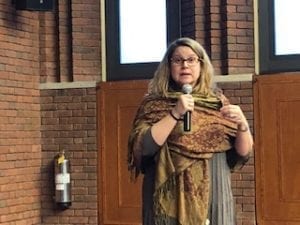
The Solidarity Center is supporting training that addresses gender-based violence in 17 countries—Robin Runge. Credit: Solidarity Center/Tula Connell
Women union leaders’ work challenging and addressing gender-based violence at work by focusing first on educating members and shifting union power dynamics that long favored men plants the seed for broader outreach.
Union leaders and members are now working toward passage of legislation in Honduras to address gender-based violence, says de Simone. And in Indonesia, SPN–NIWUF partners with some 50 organizations and unions in a nationwide campaign seeking government support for the ILO convention on gender-based violence at work. Meanwhile, the Indonesian Parliament “is actively supporting a campaign on gender-based violence because of the work the campaign has done to build consciousness,” says Izzah Inzamliyah, Solidarity Center program officer in Indonesia, who also helped translate for Nurlatifah.
Lawmakers would not have even considered such legislation before women across the nation raised their voices to end gender-based violence, she says.
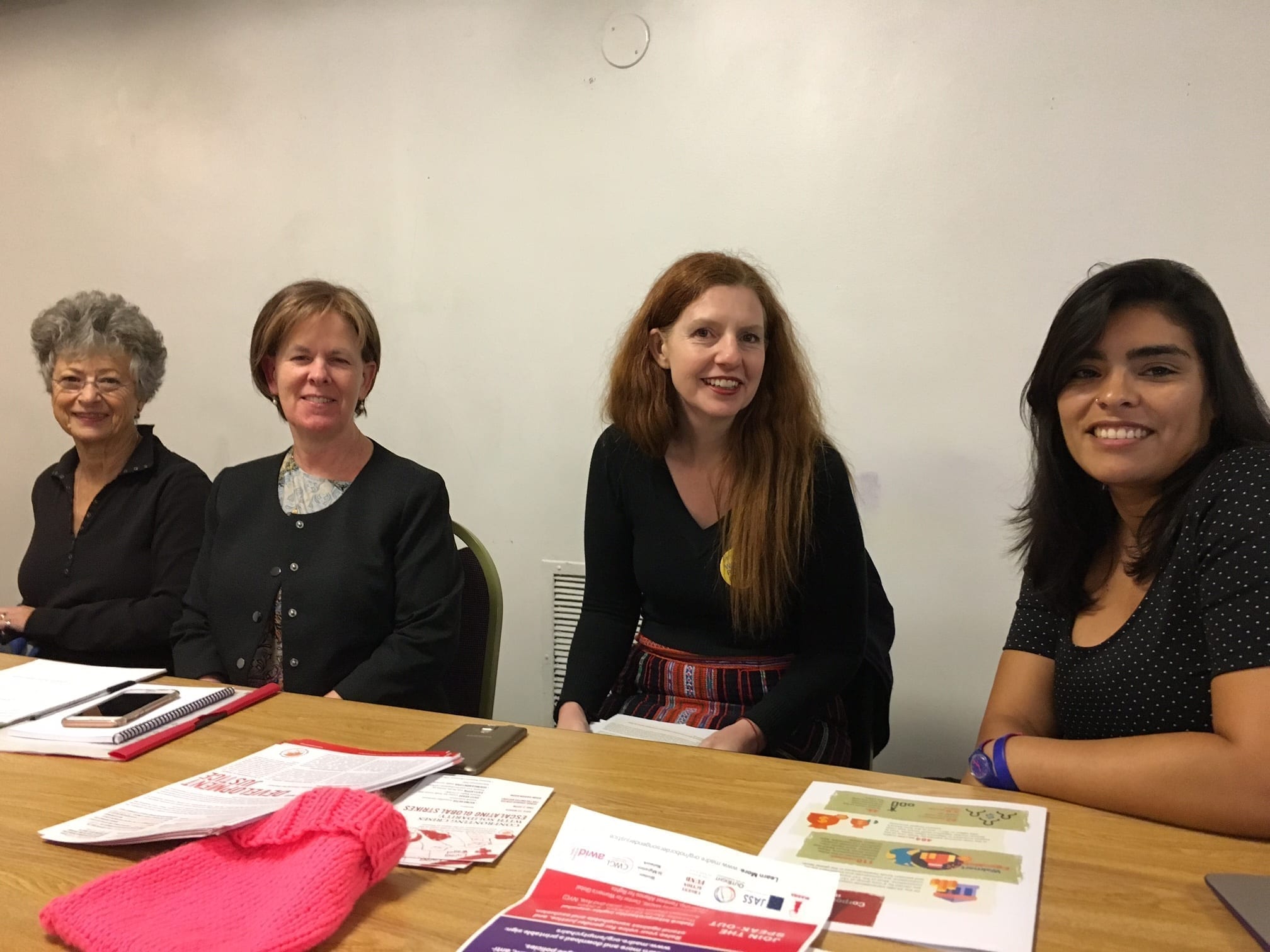
Mar 17, 2017
Understanding the scale and depth of corporate power’s impact on workers, the environment and public services—and channeling that knowledge into joint action to coordinate and maximize an effective response—is crucial to decreasing economic inequality and reclaiming space for the 99 percent, panelists said yesterday in New York City.
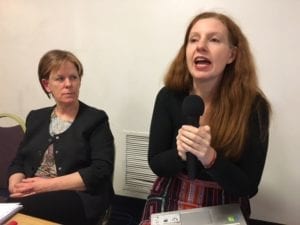
“Our solidarity is what’s important in addressing global power”—Kate Lappin, APWLD. Credit: Solidarity Center/Tula Connell
“Our solidarity is what’s important in addressing global power,” said Kate Lappin, regional coordinator of the Asia Pacific Forum on Women, Law and Development (APWLD). “The answer is not about blaming migration or ‘the other,’ the answer is solidarity,” Lappin said, speaking at “Impact of Corporate Power on Women’s Economic Empowerment,” a session sponsored by the Association for Women’s Rights in Development (AWID), Solidarity Center, APWLD and Global Policy Forum.
The panel was one of several sessions the Solidarity Center and its partners held in conjunction with the March 13–24 meeting of the United Nations Commission on the Status of Women (CSW). Some 200 union women activists from around the globe are taking part in events.
The panel stems from the 2016 report, “Challenging Corporate Power: Struggles for Women’s Rights, Economic and Gender Justice” produced by AWID and the Solidarity Center, in conjunction with Just Associates (JASS). The report explores how corporations in collusion with elites and other powerful actors are exerting their power to transform economic and political systems. The report then illustrates how this power impacts women and oppressed peoples.
Earlier this week, the Solidarity Center and International Trade Union Confederation (ITUC) convened sessions examining the prevalence of gender-based violence at work and mobilization strategies for championing passage of an International Labor Organization (ILO) convention preventing gender-based violence on the job. Yesterday, three women union activists shared their experiences helping women form unions at the AFL-CIO panel, “Building Power for Women Workers in the Changing World of Work.”
Workers Have Power because Their Labor Fuels Economy
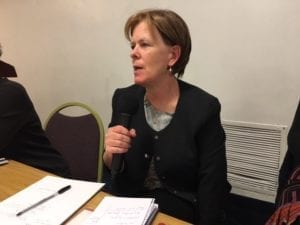
The labor movement and women’s movement have a lot to learn from each other—Lisa McGowan, Solidarity Center. Credit: Solidarity Center/Tula Connell
One of the most promising areas of cross-movement collaboration is the campaign to end gender-based violence at work, said Solidarity Center Gender Equality Director Lisa McGowan.
“It’s a really powerful issue—it helps bring together lots of different movements, primarily the labor and women’s movements—who have a lot to learn from each other,” said McGowan.
Last fall, the Solidarity Center held a multi-session workshop on building alliances around ending gender-based violence at work during the AWID Forum in Brazil, part of the Solidarity Center’s outreach efforts to connect with women’s movements and other likeminded allies around the issue. More than 2,000 women activists from around the world attended the AWID event.
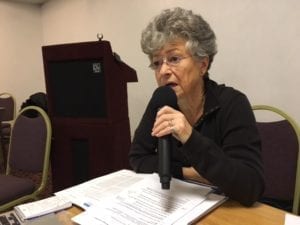
“Of the 100 largest economies today, 31 are countries”—Barbara Adams, Global Policy Watch. Credit: Solidarity Center/Tula Connell
Barbara Adams, senior policy adviser at the Global Policy Forum, discussed how growing economic inequality is hitting women workers especially hard, as wages decline along with women’s ability to exercise their rights.
Describing the increasing influence of corporate money on governments, which often contract out public services to less accountable private-sector providers, Adams said the stated goal of some corporate players is “governance without government.
“Of the 100 largest economies today, 31 are countries,” she said. “It’s no longer one person, one vote, but one dollar, one vote.” Unlike governments, corporations cannot be held accountable through the democratic process.
The role of the union movement is especially key in such an environment, said McGowan. “Workers have power because their labor is what fuels our economy,” she said.
Building on worker power in relation to corporations, the challenge for all progressive allies is to link the movements and link the strategies, she said.
Feminist Futures: Building Collective Power for Rights and Justice

Ana Abelenda, AWID, described the cross-movement dialogue behind “Challenging Corporate Power.” Credit: Solidarity Center/Tula Connell
Ana Abelenda, AWID economic justice coordinator and panel moderator, described the process behind the “Challenging Corporate Power” report, which is based on a 2016 cross-movement dialogue convened by AWID and the Solidarity Center. Facilitated by JASS in São Paulo, Brazil, the meeting brought together women trade unionists; women workers; feminists; indigenous and black women; lesbian, bisexual, trans, queer and intersex (LBTQI) activists; and women human rights defenders to discuss, debate and share understanding of corporate power and what it means to their struggles and their lives.
The report reflects the participants’ explorations of successful movements to demand accountability—for labor rights violations, ecological damage, trade liberalization and privatization. Women beer promoters in Cambodia, for example, are increasingly forming unions with the Cambodian Food Service Workers Federation (CFSWF) to protest poverty wages, sexual harassment and violence, long working hours and toxic working conditions in bars and restaurants.
CSW meetings this month involve hundreds of high-level government delegates who, for the first time, are discussing women’s economic empowerment and the role of labor unions as core to achieving women’s rights—a huge milestone for working women around the globe in achieving recognition of their workplace struggles by the world’s human rights body—and one that worker rights organizations like the ITUC and Solidarity Center have long championed.
Check out our coverage of this week’s events on Facebook and on Twitter @SolidarityCntr.
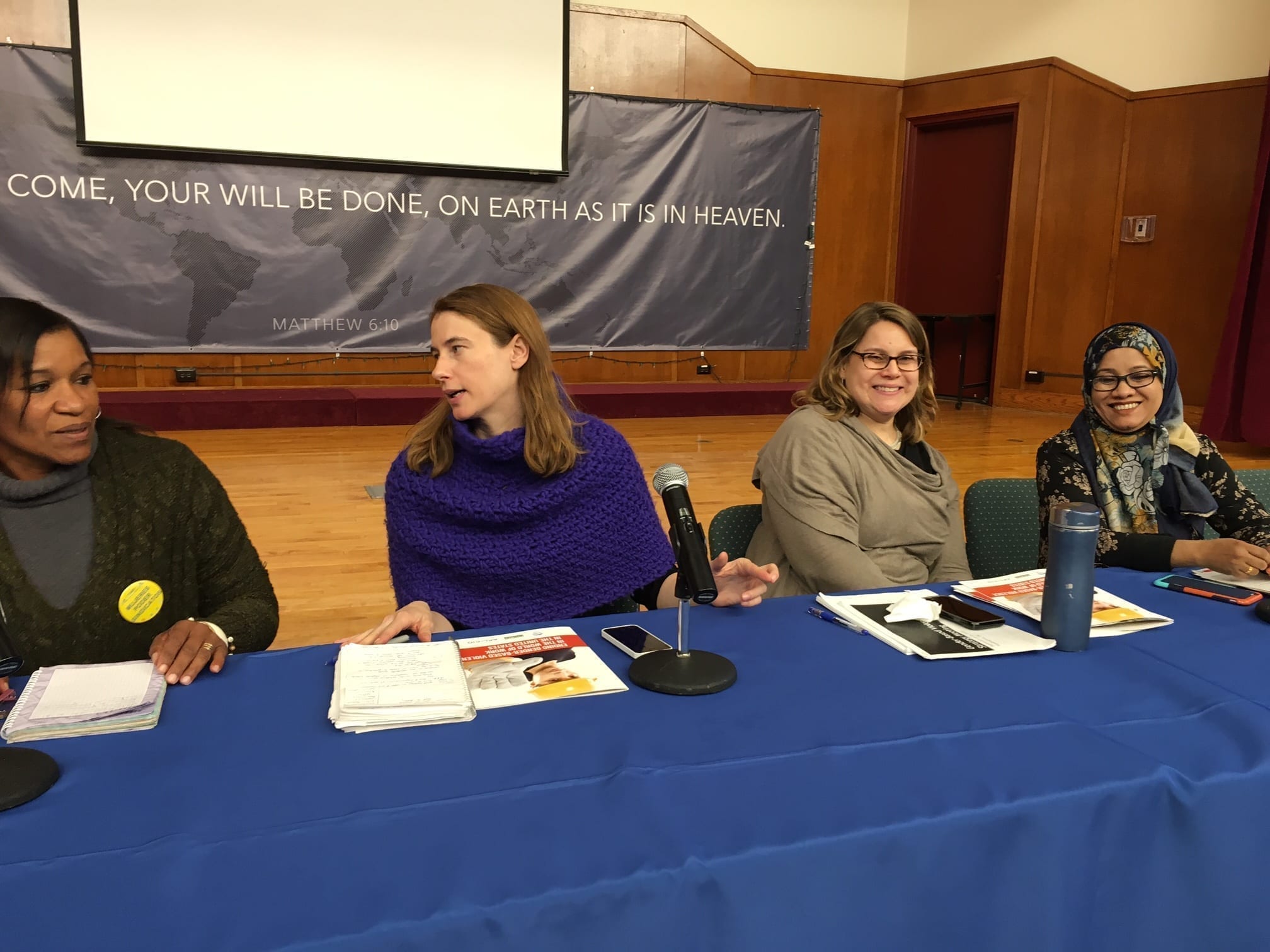
Mar 14, 2017
Gender-based violence at work is far more prevalent than reported and ending it will require women coming together to challenge male-dominated structures—whether in corporations, governments or their own unions, according to leaders and experts from a variety of unions and nongovernmental associations (NGOs) speaking yesterday in New York City.

“As prevalent as gender-based violence is in workplace, it goes unrecognized—Solidarity Center Policy Director Molly McCoy. Credit: Solidarity Center/Tula Connell
“As prevalent as gender-based violence is in workplace, it goes unrecognized,” said Solidarity Center Policy Director Molly McCoy.
McCoy was among participants on two panels Monday that focused on gender-based violence at work, part of events the Solidarity Center and its partners are holding in conjunction with the March 13–24 meeting of the United Nations Commission on the Status of Women (CSW).
Hundreds of high-level government delegates at the CSW will for the first time discuss women’s economic empowerment and the role of labor unions as core to achieving women’s rights—a huge milestone for working women around the globe in achieving recognition of their workplace struggles by the world’s human rights body—and one that worker rights organizations like the ITUC and Solidarity Center have long championed.
Gender-Based Violence Worse without Freedom to Form Unions
Panelists at the Solidarity Center session, “Eliminating Gender-Based Violence in the World of Work,” explored how unions enable workers, especially women workers, to speak up when experiencing sexual harassment and other violence on the job by providing a network of peer support.
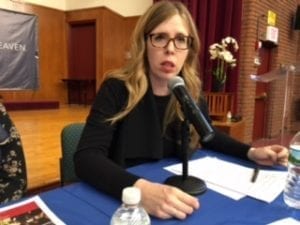
“The absolute most important thing is that we organize for worker power”—Julia Rybak. New York Hotel Trades Council. Credit: Solidarity Center/Tula Connell
“Workers having the resources and the community of support is something most workers don’t have,” said Julia Rybak, director of the New York Hotel Trades Council. “The absolute most important thing is that we organize for worker power.”
“Gender-based violence is always worse when there is no freedom of association,” said McCoy, who moderated the panel. “When workers are not organized (in unions), they don’t have resources to tackle gender-based violence.”
Conversely, McCoy said, “the persistence and prevalence of gender-based violence has an impact on freedom of association. Gender-based violence is very much a tool used to repress worker rights, to silence workers and to isolate workers so they can’t stand up for themselves and fight gender-based violence.”
“There are extraordinarily high rates of gender-based violence against women at the workplace,” said Robin Runge, a lawyer who represented survivors of violence and abuse for more than 20 years. Runge is author of the new report, “Ending Gender-Based Violence in the World of Work in the United States,” written with support from the AFL-CIO and Solidarity Center.
Women Empowering Themselves through Unions
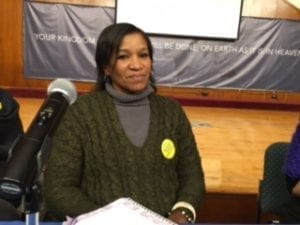
“Only by organizing can we get out of situations I faced when I was 12 and protect other domestic worker”—Ernestina Ochoa Lujan, IDWF. Credit: Solidarity Center/Tula Connell
Several panelists recounted their own experiences with workplace-based violence. Ernestina Ochoa Lujan, a domestic worker and vice president of the International Domestic Workers Federation (IDWF), began work as a domestic worker in Peru at age 11. At age 12, she was attacked by her employer.
“I couldn’t call my parents because I didn’t have parents, I couldn’t call authorities because we are not believed. I cry not because I have no hope but because I went on to organize with my union,” she said through a translator.
“Only by organizing can we get out of situations I faced when I was 12 and protect other domestic workers.”
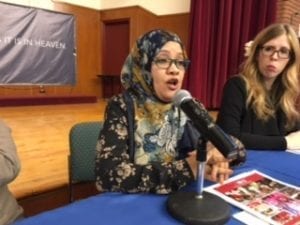
“We have to think about all those workers whose voice is not here”—Kazi Fouzia, DRUM. Credit: Solidarity Center/Tula Connell
Panelists and some of the several dozen audience members who spoke during a question and answer period described widespread violence against women workers—in Algeria, Argentina, Colombia and wherever women work and in whatever sector they are employed.
“We have to think about all those workers whose voice is not here,” said Kazi Fouzia, director of organizing at the New York-based Desis Rising Up and Moving (DRUM) organization, a 4,000-member worker association that includes primarily women in the informal economy.
Join the Stop Gender-Based Violence Campaign
Earlier in the day, 75 participants discussed steps involved in building support for an International Labor Organization (ILO) convention on ending gender-based violence.
“It’s important we go to the governments to make sure they support an ILO convention. We need a critical number of governments to move it forward,” said Marieke Koning from the Equality department at the International Trade Union Confederation (ITUC). The ITUC sponsored the panel, “Stop Gender-Based Violence (GBV) in the World of Work Campaign: How to Support an ILO Convention.”
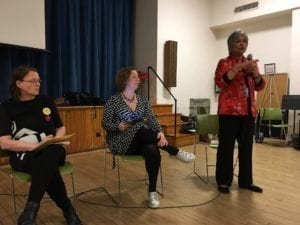
Amrita Sietaram, ILO ACTRAV section, described the process of creating and passing a convention to end gender-based violence at work. Credit: Solidarity Center/Tula Connell
Koning was joined by Amrita Sietaram from the ILO ACTRAV section, who described the process of creating and passing a convention to end gender-based violence at work, which she says has moved forward because of the efforts of the ITUC and global union federations. The ILO will discuss a draft text in June 2018 and unions, employers and others have from May to September this year to comment on the draft text.
Sietaram also described significant “employer resistance to a gender-based violence at work convention,” and noted that discussions will determine whether the final product is a “convention”—which governments agree to follow, or a “recommendation,” a weaker outcome that provides direction.
Speaking from the audience, IDWF General Secretary Elizabeth Tang described how domestic workers around the world worked for years to achieve 2011 passage of ILO Convention 189 covering domestic workers—and how the union has begun to reproduce those steps to move passage of a convention to end gender-based violence at work.
Join the ITUC campaign to end gender-based violence at work.
Follow us here, on Facebook and on Twitter @SolidarityCntr for coverage of the following Solidarity Center and partner events:
- March 15, 12:30 ET: “Building Power for Women Workers in the Changing World of Work”—AFL-CIO
- March 16, 12:30 ET: “Impact of Corporate Power to Women’s Economic Empowerment”—Association for Women’s Rights in Development (AWID) & Solidarity Center
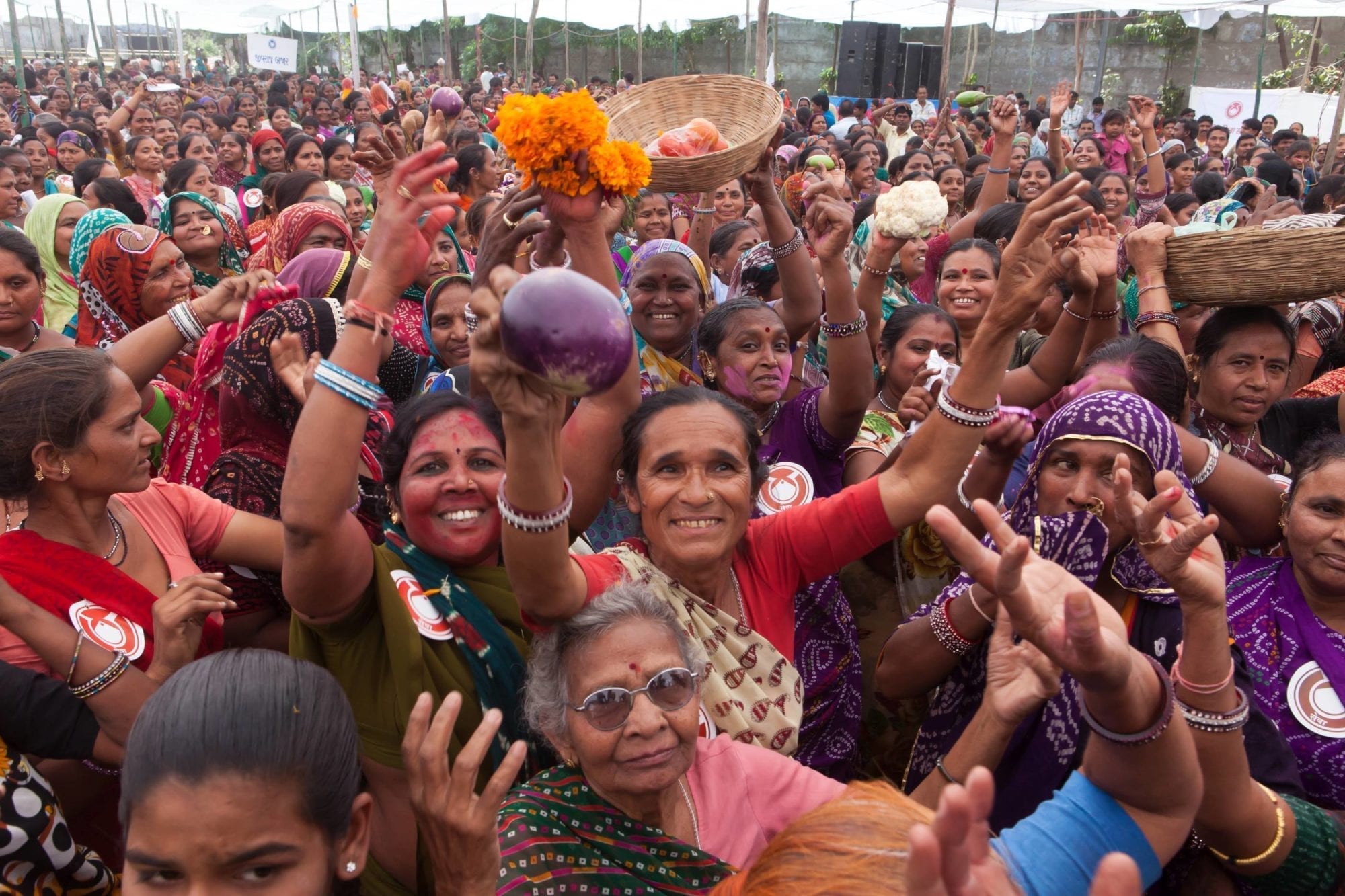
Mar 8, 2017
Hundreds of high-level government delegates at the Commission on the Status of Women (CSW) meeting at the United Nations in New York this month will for the first time discuss women’s economic empowerment and the role of labor unions as core to achieving women’s rights.
“Women’s Economic Empowerment in the Changing World of Work,” the topic of the March 13–24 meeting, represents a huge milestone for working women around the globe in achieving recognition of their workplace struggles by the world’s human rights body—and one that worker rights organizations like the International Trade Union Confederation (ITUC) and Solidarity Center have long championed.
Simultaneously, the global union movement, together with the Solidarity Center, is bringing together some 200 labor activists from around the world to New York for workshops and a four-day women’s leadership training.
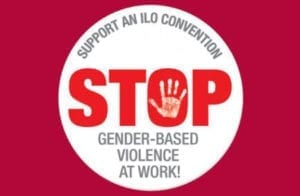 Labor and allied sessions include the Solidarity Center workshop on eliminating gender-based violence at work on March 13 and a discussion on the “Impact of Corporate Power on Women’s Economic Empowerment.” The latter event, sponsored by the Association of Women in Development (AWID) and Solidarity Center, is based on a joint 2016 report, “Challenging Corporate Power for Gender Justice: Highlights from a Cross-Movement Dialogue,” which outlines how national and transnational corporations can exploit women and other marginalized people and offers insights into strategies for resistance.
Labor and allied sessions include the Solidarity Center workshop on eliminating gender-based violence at work on March 13 and a discussion on the “Impact of Corporate Power on Women’s Economic Empowerment.” The latter event, sponsored by the Association of Women in Development (AWID) and Solidarity Center, is based on a joint 2016 report, “Challenging Corporate Power for Gender Justice: Highlights from a Cross-Movement Dialogue,” which outlines how national and transnational corporations can exploit women and other marginalized people and offers insights into strategies for resistance.
Concrete Achievements through the UN Process
The Solidarity Center has long focused on making working women’s issues a priority for UN bodies and, most recently, had its recommendations on employment, gender-based-violence and other workplace abuses included in a Committee on the Elimination of Discrimination against Women (CEDAW) report on behalf of Honduras.
Issued in November, CEDAW’s report, “Concluding Observations on the Combined Seventh and Eighth Periodic Reports of Honduras,” incorporates Solidarity Center recommendations to address the persistent gender wage gap; the lack of regulations protecting women from exploitative working conditions, like domestic work; and severe health and safety dangers for women agricultural workers. The UN formed CEDAW in 1979 following CSW’s recommendation that a single entity champion international standards on the equal rights of men and women.
Solidarity Center and Global Labor Help Shape CSW Document
The Solidarity Center and global unions contributed to a document on women’s empowerment at work that the CSW will discuss and amend before approving at the end of the March meeting. They urged the CSW to acknowledge the economic impact of globalization on women workers’ wages and the socioeconomic conditions fueling “the accelerated feminization of poverty.”
Crucially, global unions are recommending the CSW “recognize the importance of trade unions in addressing persistent economic inequalities,” in closing the gender wage gap, the gap between minimum and living wages, and social protection gaps.
The Solidarity Center participated in crafting the draft document throughout a yearlong process in advance of the CSW meeting. In 2016, the Solidarity Center and ITUC were among 25 participants at an Expert Group Meeting convened by UN Women to discuss and prepare the first draft. At the meeting, the Solidarity Center presented the paper, “Women’s Labor Rights and Economic Power, Now and in the Future.”
Created in 1946, the CSW is the main global intergovernmental body exclusively dedicated to the promotion of gender equality and the empowerment of women and is part of the UN Economic and Social Council (ECOSOC).
Watch the Solidarity Center website for coverage of the global union events and follow the action at our Facebook page and on Twitter @SolidarityCntr.























